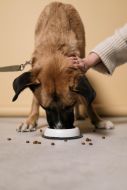Tips for Choosing the Military k9 Handler in Your City

Many specialty military roles provide rewarding possibilities and the opportunity to develop new abilities. One such duty is that of a military k9 handler. Knowing more about what this specialty role entails and what it entails might help you determine if military service is exemplary for you.
What is the role of a dog handler?
A military k9 handler is an army specialist responsible for caring for and training a military working dog (MWD). Although service dogs are helpful in various situations, each dog is trained for only one function to maintain their specialization. Handlers and their dogs can engage in the following activities:
• Patrol or combat tracking
• Detector dog on patrol for explosives (PEDD)
• Searches for health and wellbeing
• Rescue and search operations
• Veterans’ rehabilitation
• Drug-sniffing dog on patrol (PDDD)
• Functions to maintain law and order
• Support for customs or checkpoints
• Protection for VIPs
K-9 units are used by the United States military in various functions, depending on the environment in which the dog is working. A dog handler collaborates closely with their pet, sharing training exercises, performing dog-specific training, and participating in missions. For someone who appreciates dealing with animals, becoming a dog handler may be a rewarding job.
How to Join the Army as a Dog Handler
There are a few phases to becoming a dog handler in the Army. A military dog handler’s typical professional path is as follows:
- Take an aptitude exam for military service.
The Armed Services Vocational Aptitude Battery (ASVAB) exam evaluates which military areas a potential service member may thrive in. Higher ASVAB scores may open the door to specialized military occupations and decide whether an applicant can enroll in the Military.
A 91 ASVAB score in the skilled technical section is required for the post of Army dog handler. After the ASVAB, the recruiter will most likely contact you to set up a physical fitness exam. You must also be a Permanent resident and pass security clearance to be considered for dog handling employment.
- Complete your basic training and attend individual advanced training sessions.
Following your acceptance into the Military, you must complete ten weeks of basic training, also known as “boot camp.” This 10-week training school instils personal discipline and physical fitness in recruits and teaches them how to work together with the rest of their platoon. Rifle training and basic survival skills are included in the boot camp.
After completing basic training, a potential dog handler will get 17 weeks of advanced individual instruction. The dog handler learns specific dog handling skills and animal handling, and other technical skills in this class. These skills can help build the bond between the handler and the service animal.
- Obtain certification.
Before beginning responsibilities, a handler and dog team must pass certification testing and recertify every year. A variety of exams tailored to the dog’s specialist may be required for certification.
- Be a part of active duty
After completing primary and advanced training, a dog handler can join the Army as an Army dog handler. A dog handler can go to higher grades after that, but they are still responsible for the care and training of the service animal. Some dog handlers serve with their partners throughout their whole military career.
Skills of a dog handler
On the job, a standard dog handler picks up valuable skills. The following hard and soft talents, as well as others, may be required to perform the tasks of this position:
Animal handling: This work necessitates a thorough understanding of how to handle properly and care for a dog, as well as animal instincts and field experience. In a military situation, a dog handler also learns to engage with the dog under extreme stress.
Compassion: Dog trainers bring understanding to their profession, which allows them to work closely with the animal.
Patience: Because training an animal might take weeks or even months, a potential military k9 handler should have a certain amount of patience.
Military ethics: Serving in the Military necessitates adherence to a code of ethics and behavior and maintaining a professional demeanor both on and off duty. This involves, among other things, the correct handling of civilians and the observance of military oaths.
The dog’s certification areas, the competence of the handler, and the dog’s motivation are also considerations for selecting a military k9 handler. The average elapsed time to obtain certification is around two years.


Leave a Reply